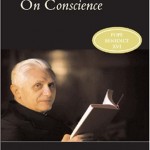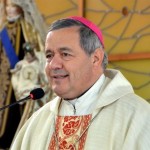In my my first reaction to Benedict’s announcement yesterday, I wrote:
Listening to some of the inanities coming out of the mouths of cable news anchors, and noting the way they are quickly, predictably, focusing on the “negative narratives” — one voice on cable anchor is making it sound like the church has just endured 32 years of misery and she imagines “great joy” among “progressive” Catholics and “confusion” among “conservative” ones — how grateful I am that, thanks to Benedict’s awareness, there is a hardy and energetic internet presence, well-established and looked upon with encouragement by Rome (and increasingly entered into and brilliantly utilized by smart bishops, priests, religious and layfolk). Thanks to that, we’ll explore this very new ground, together, with our diverse points of view laid out and hashed out, all while trusting that the Holy Spirit is guiding what occurs, as has been true since Pentecost.
There are lots of great comments in that thread, but this one really resonated with me:
What is disheartening is the almost total absence of Catholic commentators in the comboxes of yahoo, google, huffpo, etc. While the sheer amount of absolutely evil comments are intimidating, I see no attempt to correct or educate or evangelize there.
We have a serious problem in that we have allowed ourselves to become digitally ghettoized. We do not venture outside of the Catholic blogs/websites and that is a shame.
The Digital Catholic ghetto is something I’ve written and spoken about at length. It is a true concern. We marginalize ourselves when we limit our reading and conversion only to those we mostly agree with. It’s a danger for everyone, on the ‘net, not just Catholics. But that said, it is important for Catholics to attempt to insert Catholic thinking, Catholic reason into the roiling debates of our time — it must be done without emotion, without venom and with a willingness to be humbled before others.
This is a difficult thing to do; it is evangelizing rather the way the pope would do it — and yes, no wonder he is tired. The pope is quite literally the most universally “hated” man in the world. While many love him, of course, one need only look at the comboxes my commenter noted (or read @Pontifex’s insanely hateful twitter feed) to get a taste of the sort of bottomless, often evil hate that is directed toward the pontiff. It is a hate that will be directed toward any pontiff that does not endorse the morals and temperaments of the age, no matter what they are — enthrallment to ages and trends has always drawn us away from God and rendered humans barking mad at those who would counsel against it.
So, note the hate the pope sees, note the negativity and bile that is directed toward him, and expect to encounter some (smaller) measure of that, whenever you exit the Catholic ghetto and engage the world — particularly the most determinedly secular parts of it.**
But if we’re going to do it — if we’re going to sow seeds in the Virtual Field of the Lord, we need to know the rows are hoed on the ground, that the local churches and diocese are ready to receive the seeds and nurture them into growth. And these days, a good amount of that will happen online, from the first moment someone uses a search engine to find their local churches.
 It seems perfectly fitting, a day after the announced resignation of our first Tweeting Pope — a pope who early on understood the need for Catholics to embrace New Media — that I interview a young man who, with two friends, has decided to do the geeky, unglamorous work of teaching bishops and “front office” parish workers how to make themselves digitally read, and appealing, to Catholics and others seeking them out:
It seems perfectly fitting, a day after the announced resignation of our first Tweeting Pope — a pope who early on understood the need for Catholics to embrace New Media — that I interview a young man who, with two friends, has decided to do the geeky, unglamorous work of teaching bishops and “front office” parish workers how to make themselves digitally read, and appealing, to Catholics and others seeking them out:
[Brandon] Vogt—an engineer by trade—has partnered with Flocknote founder Matt Warner and eCatholic’s founder Josh Simmons to take on what might be called the geek’s task: They have designed a one-day conference to instill a confident sense of Internet craft and courage to pastors and parish coordinators who know they need to be online, but are not quite sure what that entails. I asked Vogt some questions about his ministry.
Elizabeth Scalia: What exactly is a Digital Church Conference?
Brandon Vogt: The Digital Church Conference is a one-day guide to mastering new media. Through several talks, interactive demos, and panel discussions, we teach people everything they need to know, from perfecting their website, to building social networks, to evangelizing online. We arrange the entire event and provide basically everything. All we need from them is the venue, a video projector and screen, and a hand dispensing the marketing media, which includes a custom video.
What inspired this whole concept?
Matt Warner, Josh Simmons, and I are all tech-savvy; we realized that amidst this swirling world of Facebook, YouTube, blogs, and text-messaging most Catholics are both excited and terrified. They know this new media is powerful, and they know they should be using it. But they’re simply afraid to dive in. They’re wary of the dangers, they don’t know where to start, and even if they do, they’re unsure how to move forward.
So, “be not afraid?”
Over and over, Pope Benedict has called on the laity to master these new media tools. That requires education and help, so the three of us created this conference with the goal of making it as easy and cheap as possible for dioceses to help their parishes and ministries harness this technology. We want to bring it to every diocese in the country.
Read the whole thing and take a look at your parish and diocesan websites. If they’re not dynamite fields, plowed and ready for the seeds…pass this information on to your pastor, and your bishop! Show them the video!
http://www.youtube.com/watch?v=_9RoG0apajw**Look for another post on this, shortly.












